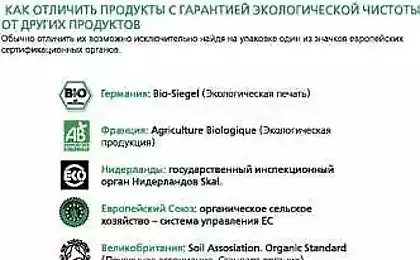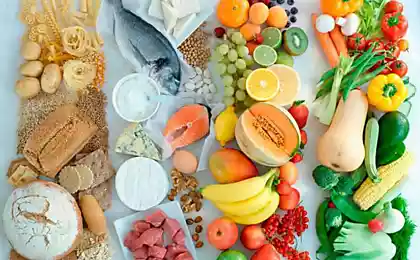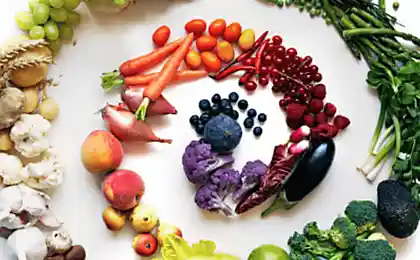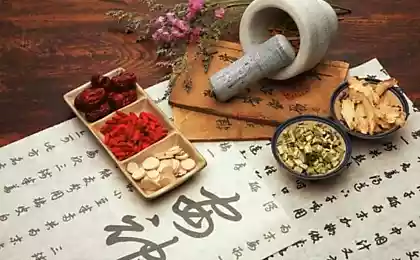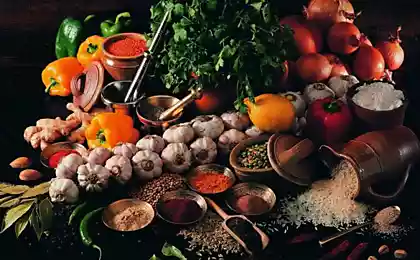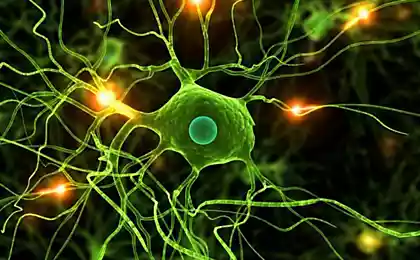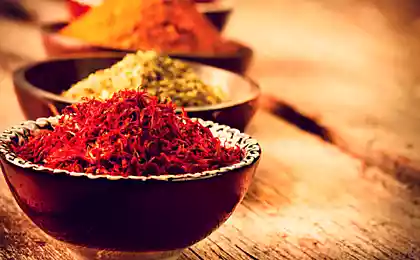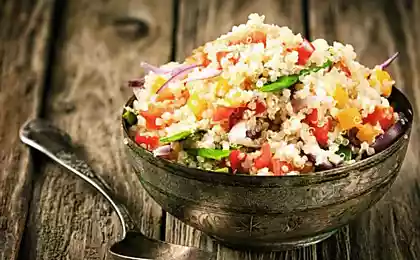748
How to fake food (10 photos)
Food production is likely to never get tired to amaze us with ingenuity, especially when it comes to the creation of fake products.
1. Sour cream - fake.
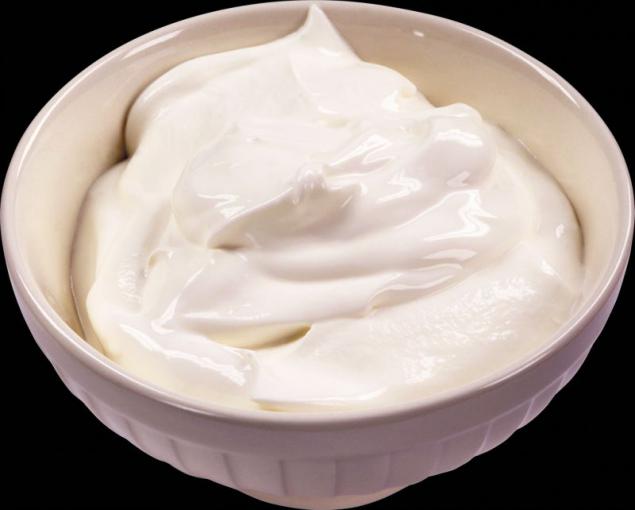
One of the most popular dairy products. Today, shops offer us a different fat sour cream, but are silent about the fact that it has long ceased to be a real sour cream. We buy stuff like her both in appearance and taste. What we eat, really? Animal fat is replaced with vegetable, milk protein, soybean, and the soybean-genetically modified. It adds flavor and on the shelves. Sour cream is very useful, it is very quickly absorbed by the body, but it concerns cream, cooked in the classical way, ie exclusively from cream and sourdough. And this cream on the shelves today, is easy enough to find. How to check the naturalness of the product? Very simply, it is necessary to dissolve a teaspoon of sour cream in a cup of boiling water. Forgery of precipitates, and the present is completely dissolved.
2. Caviar - a fake.
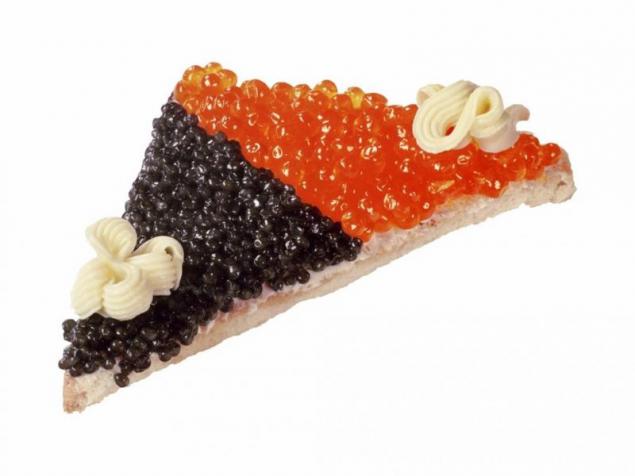
In Russia, the eggs began to bring to the table more than 300 years ago. Peter held the 1st special 50 fishermen, who supplied eggs to the royal court.
Today, this delicacy is rich in iodine from the high price is not available to all. Therefore, the red and black caviar learned to forge. Make it out of algae, and a taste of caviar gives gelatin. But even if the calf has the smell of fish, and eggs the correct form, and have the necessary color, all this does not prove their naturalness. Natural caviar when compressed bursts and has a bitter taste and a fake just chewed. The natural caviar, eggs must be whole, the liquid should be not much. If the caviar of salt is less than that is laid, it may not survive until the end of the implementation period.
Shelf life of eggs three days after the catch, that's why the producers to extend the added preservatives. The best caviar packed in cans July to September, at this time of spawning salmon, and more likely, the manufacturer used a minimum of preservatives.
Check natural caviar. If a container with boiling water to throw real eggs, the protein begins to fold, leaving a white trail in the water, and she will remain unharmed spawn. Artificial eggs in boiling water, after a while lose form and will begin to dissolve.
3. Canned.
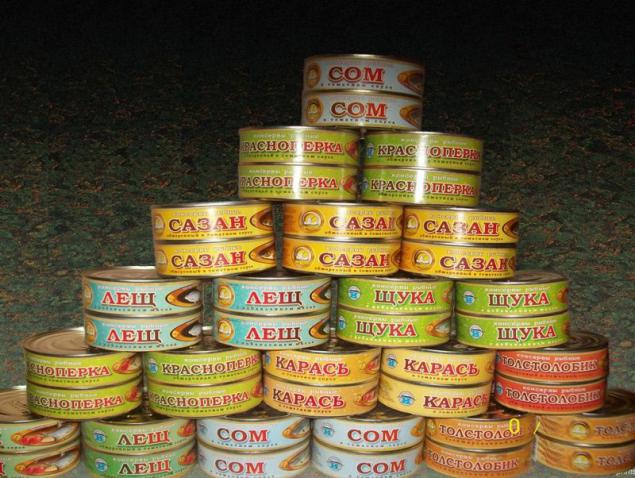
The problems that can face the buyer.
- The ratio of fish and sauce. If the manufacturer uses the sauce more than is necessary, he saves;
- To the most fish is often added enlargers volume;
- The presence of preservatives (eg sorbic acid);
- When not properly plugging canned tin can get inside and oxides.
Preservatives. The use of preservatives began in antiquity. People always want to extend the life of the product. Salt, honey, wine. Later replaced by wine vinegar and ethanol. For preserving foods, spices extracted from essential oils. All would be good if the natural preservatives are not replaced by synthetic.
They stop the formation of the product as well as the harmful and beneficial bacteria. Thanks to them, increases the shelf life of the product, color, smell.
On the other hand, they can trigger indigestion, changes in blood pressure, even cancer.
4. Crab sticks.

Judging by the title - a delicacy. But consumers have long known that there is no crab sticks crab. But not many people know that most of the fish even there. Judging by the inscriptions on the packaging of the crab sticks include starch, dyes, preservatives and surimi (minced fish).
As it turns out, minced fish of the fish no more than 10%. After analysis, the experts did not manage to find out exactly what kind of substances make up the remaining 90%.
After the publication of the results of this study in the press, the sale of crab sticks fell several times. The saddest thing is that the manufacturers do not tell the whole truth about the composition of "not crab sticks." The conclusion is simple, crab sticks - a product with unknown ingredients, and there was not just not worth it, and absolutely not worth it.
5. Smoked fish.
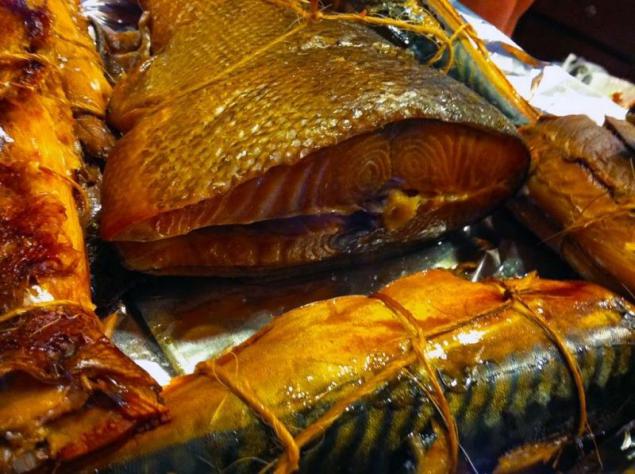
Mostly it is done with a liquid smoke - a strong carcinogen, banned in many countries.
The manufacturer claims that the main component of this fluid - extract from the usual smoke. A recipe for manufacturing is kept secret. Quickly to smoke the fish is no longer a problem, do not need any smoker or cherry chips.
The recipe. It's very simple, half liter of water two tablespoons of salt and 50 grams. liquid smoke. Dipping the fish and leave in the refrigerator for two days. All smoked fish ready. But what about the heat treatment, which is to kill botulism, cholera, salmonella, staph, and all sorts of worms? We whole bunch of probabilities offer to buy, along with the fish. It would be fair to call it is not smoked fish, and "russkoruletochnoy" fish. One conclusion, want to live simply do not eat "ruskoruletochnuyu" fish.
To distinguish it from the real smoked too easy. In this smoked fish and meat at the cut has a yellowish tint, and in the area of stomach fat is going to the same color. Painted Fish in the context of a simple color selection herring and virtually no fat. Therefore, when buying smoked fish ask the seller to cut it. And pay attention to the date of smoking, as if not stored properly, the probability of harmful bacteria increases greatly.
6. Shrimp.
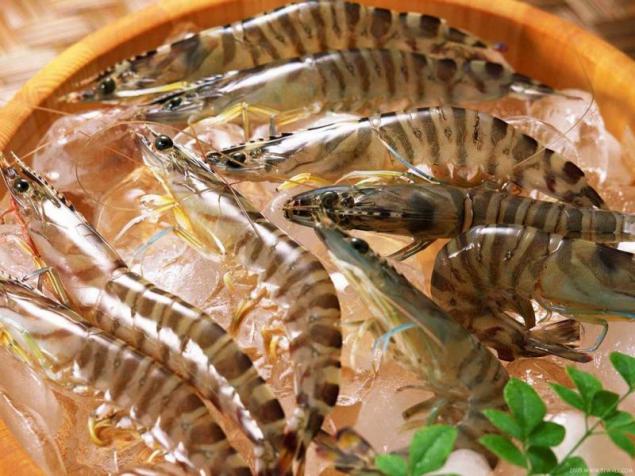
Buying shrimp, actually we buy water. They are frozen immediately after the catch: shrimp glazed with ice so they do not break. The amount of ice in the shrimp are not specified by the manufacturers, because the rules on the quantity is not there. These manufacturers increase the weight percent 10-40.
The packaging is also listed caliber shrimp, the essence of it, the number of shrimp per kilogram. But this is true not only for peeled shrimp. These rules violate almost all manufacturers. Coastal plankton can accumulate heavy metals in itself.
Quite a long time learned to breed shrimp in the coastal zone. Shrimp grown piece, contain antibiotics, which are added to the water to shellfish does not hurt. Excess antibiotics in the body causes allergic reactions dizbakterioz kills micro flora in the body. The most commonly used chloramphenicol, which is very slowly eliminated from the human body. Unfortunately so far we do not have laws that regulate the presence of growth stimulants or antibiotics in shrimp.
In the eyes presence of antibiotics in shrimp can not be detected. Therefore, when buying look for "Atlantic" shrimp that is caught in the sea, they are much less antibiotics.
Conclusion: shrimp in a very high probability of the presence of antibiotics, so it is advisable to limit the use of shrimp to several times a month. Especially if the manufacturer shrimp questionable.
7. Most of the honey, soy sauce and spices in stores - fake
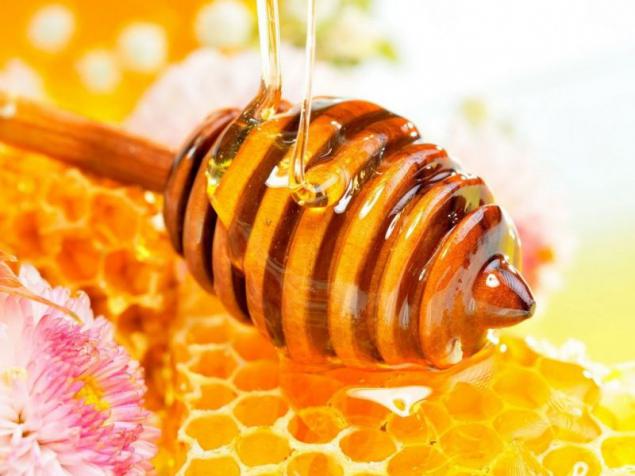
Most of the honey market participants around the world to buy honey of questionable quality in China. The Chinese honey pollen is usually filtered - this is done to disguise its origin. Consequently, the resulting substance honey rightfully can be called.
Soy sauce, too much of a fake, although it would seem, the very soybeans - the raw material is quite affordable. Here the point is that the process of production of the soy sauce is too long and time consuming. Therefore, many enterprising producers decided to refocus on the "precocious" imitation, which is preparing for three days, and kept incomparably longer.
But worst of all, perhaps, is the case with saffron. It is expensive, no wonder it is called the "king of spices". Per kilo of the saffron will have to pay about twenty thousand dollars. That's impressive, considering that most manufacturers claiming to sell spices only "high quality", in fact, in each package saffron ten percent or so. The rest - worthless crushed plants.
8. Using a special glue scraps of meat can make a big and tasty steak
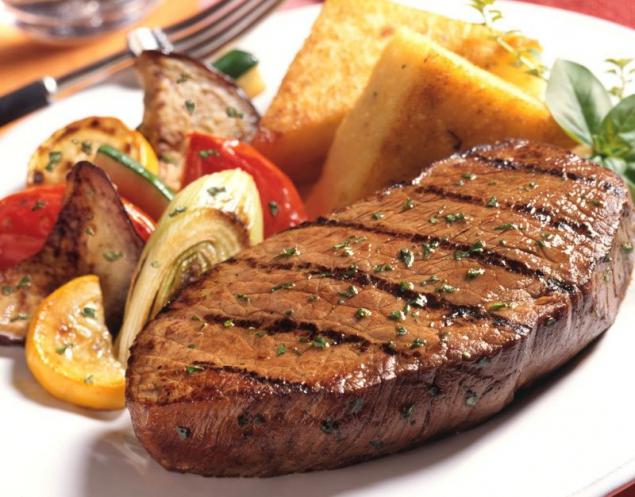
The substance that glues the pieces of meat, called "transglutaminase" or simply "meat glue". This enzyme makes it possible to give a fashionable chefs have cooked meat dish or crab burgers any intricate shape.
Much less innocuous looks other use of transglutaminase. In a large meat production always remains a lot of pieces and scraps that are suitable except in the animal feed. And thanks to the transglutaminase thrifty entrepreneurs can glue any waste of meat production into a single whole and to avoid financial losses. Moreover, ordinary consumers to distinguish such a mosaic from the usual piece of meat is very easy.
9. Salmon color pink
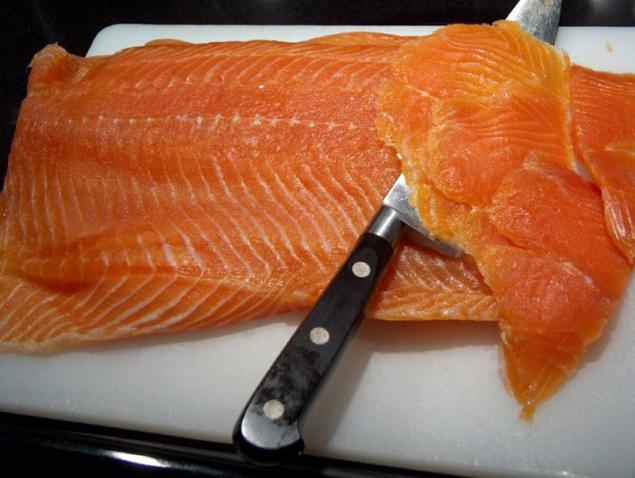
This color is salmon (trout, salmon), which lies on the shelves of our stores - a pale gray. Now it is mainly grown artificially - on farms, where the poor fish is devoid of natural food and live in such close quarters, practically unable to move.
To give the same fish a beautiful pink color, manufacturers, as you may guess, stuffed it with special coloring agents. These pills salmon make even different shades - for different tastes owners aquaculture enterprises.
Today is grown on farms, about 95% of the Atlantic salmon, and virtually all of it - painted.
10. The Italian Mafia is engaged in a fake olive oil
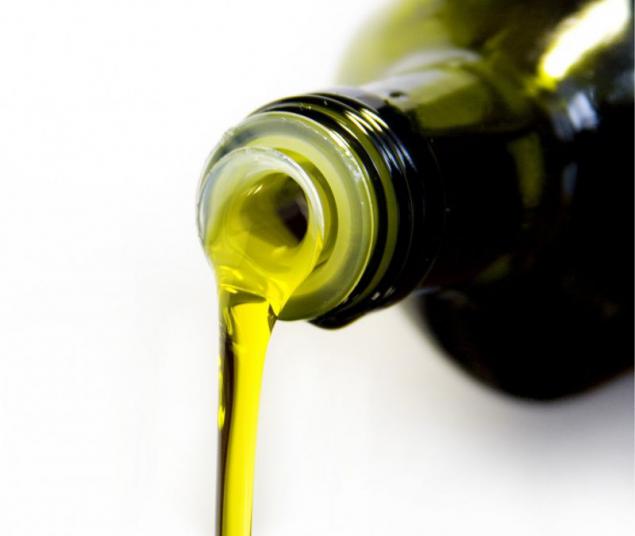
As strange as it sounds, but the falsification of olive oil - one of the most lucrative "activity" of the Italian mafia. Income from olive oil are comparable to their income from drug trafficking. For ordinary consumers, this means that most of the olive oil on the market or strongly diluted cheaper raw materials or a complete imitation.
That oil, which today are sold under the guise of high-quality olive oil, at least 80% - a mixture of cheap vegetable oils from Tunisia, Morocco, Greece and Spain. No special benefit from such a product, of course not. At least not more than from conventional sunflower oils. Surprisingly, people are so used to the taste of fakes is now a real pure product is often mistaken for a fake.
1. Sour cream - fake.

One of the most popular dairy products. Today, shops offer us a different fat sour cream, but are silent about the fact that it has long ceased to be a real sour cream. We buy stuff like her both in appearance and taste. What we eat, really? Animal fat is replaced with vegetable, milk protein, soybean, and the soybean-genetically modified. It adds flavor and on the shelves. Sour cream is very useful, it is very quickly absorbed by the body, but it concerns cream, cooked in the classical way, ie exclusively from cream and sourdough. And this cream on the shelves today, is easy enough to find. How to check the naturalness of the product? Very simply, it is necessary to dissolve a teaspoon of sour cream in a cup of boiling water. Forgery of precipitates, and the present is completely dissolved.
2. Caviar - a fake.

In Russia, the eggs began to bring to the table more than 300 years ago. Peter held the 1st special 50 fishermen, who supplied eggs to the royal court.
Today, this delicacy is rich in iodine from the high price is not available to all. Therefore, the red and black caviar learned to forge. Make it out of algae, and a taste of caviar gives gelatin. But even if the calf has the smell of fish, and eggs the correct form, and have the necessary color, all this does not prove their naturalness. Natural caviar when compressed bursts and has a bitter taste and a fake just chewed. The natural caviar, eggs must be whole, the liquid should be not much. If the caviar of salt is less than that is laid, it may not survive until the end of the implementation period.
Shelf life of eggs three days after the catch, that's why the producers to extend the added preservatives. The best caviar packed in cans July to September, at this time of spawning salmon, and more likely, the manufacturer used a minimum of preservatives.
Check natural caviar. If a container with boiling water to throw real eggs, the protein begins to fold, leaving a white trail in the water, and she will remain unharmed spawn. Artificial eggs in boiling water, after a while lose form and will begin to dissolve.
3. Canned.

The problems that can face the buyer.
- The ratio of fish and sauce. If the manufacturer uses the sauce more than is necessary, he saves;
- To the most fish is often added enlargers volume;
- The presence of preservatives (eg sorbic acid);
- When not properly plugging canned tin can get inside and oxides.
Preservatives. The use of preservatives began in antiquity. People always want to extend the life of the product. Salt, honey, wine. Later replaced by wine vinegar and ethanol. For preserving foods, spices extracted from essential oils. All would be good if the natural preservatives are not replaced by synthetic.
They stop the formation of the product as well as the harmful and beneficial bacteria. Thanks to them, increases the shelf life of the product, color, smell.
On the other hand, they can trigger indigestion, changes in blood pressure, even cancer.
4. Crab sticks.

Judging by the title - a delicacy. But consumers have long known that there is no crab sticks crab. But not many people know that most of the fish even there. Judging by the inscriptions on the packaging of the crab sticks include starch, dyes, preservatives and surimi (minced fish).
As it turns out, minced fish of the fish no more than 10%. After analysis, the experts did not manage to find out exactly what kind of substances make up the remaining 90%.
After the publication of the results of this study in the press, the sale of crab sticks fell several times. The saddest thing is that the manufacturers do not tell the whole truth about the composition of "not crab sticks." The conclusion is simple, crab sticks - a product with unknown ingredients, and there was not just not worth it, and absolutely not worth it.
5. Smoked fish.

Mostly it is done with a liquid smoke - a strong carcinogen, banned in many countries.
The manufacturer claims that the main component of this fluid - extract from the usual smoke. A recipe for manufacturing is kept secret. Quickly to smoke the fish is no longer a problem, do not need any smoker or cherry chips.
The recipe. It's very simple, half liter of water two tablespoons of salt and 50 grams. liquid smoke. Dipping the fish and leave in the refrigerator for two days. All smoked fish ready. But what about the heat treatment, which is to kill botulism, cholera, salmonella, staph, and all sorts of worms? We whole bunch of probabilities offer to buy, along with the fish. It would be fair to call it is not smoked fish, and "russkoruletochnoy" fish. One conclusion, want to live simply do not eat "ruskoruletochnuyu" fish.
To distinguish it from the real smoked too easy. In this smoked fish and meat at the cut has a yellowish tint, and in the area of stomach fat is going to the same color. Painted Fish in the context of a simple color selection herring and virtually no fat. Therefore, when buying smoked fish ask the seller to cut it. And pay attention to the date of smoking, as if not stored properly, the probability of harmful bacteria increases greatly.
6. Shrimp.

Buying shrimp, actually we buy water. They are frozen immediately after the catch: shrimp glazed with ice so they do not break. The amount of ice in the shrimp are not specified by the manufacturers, because the rules on the quantity is not there. These manufacturers increase the weight percent 10-40.
The packaging is also listed caliber shrimp, the essence of it, the number of shrimp per kilogram. But this is true not only for peeled shrimp. These rules violate almost all manufacturers. Coastal plankton can accumulate heavy metals in itself.
Quite a long time learned to breed shrimp in the coastal zone. Shrimp grown piece, contain antibiotics, which are added to the water to shellfish does not hurt. Excess antibiotics in the body causes allergic reactions dizbakterioz kills micro flora in the body. The most commonly used chloramphenicol, which is very slowly eliminated from the human body. Unfortunately so far we do not have laws that regulate the presence of growth stimulants or antibiotics in shrimp.
In the eyes presence of antibiotics in shrimp can not be detected. Therefore, when buying look for "Atlantic" shrimp that is caught in the sea, they are much less antibiotics.
Conclusion: shrimp in a very high probability of the presence of antibiotics, so it is advisable to limit the use of shrimp to several times a month. Especially if the manufacturer shrimp questionable.
7. Most of the honey, soy sauce and spices in stores - fake

Most of the honey market participants around the world to buy honey of questionable quality in China. The Chinese honey pollen is usually filtered - this is done to disguise its origin. Consequently, the resulting substance honey rightfully can be called.
Soy sauce, too much of a fake, although it would seem, the very soybeans - the raw material is quite affordable. Here the point is that the process of production of the soy sauce is too long and time consuming. Therefore, many enterprising producers decided to refocus on the "precocious" imitation, which is preparing for three days, and kept incomparably longer.
But worst of all, perhaps, is the case with saffron. It is expensive, no wonder it is called the "king of spices". Per kilo of the saffron will have to pay about twenty thousand dollars. That's impressive, considering that most manufacturers claiming to sell spices only "high quality", in fact, in each package saffron ten percent or so. The rest - worthless crushed plants.
8. Using a special glue scraps of meat can make a big and tasty steak

The substance that glues the pieces of meat, called "transglutaminase" or simply "meat glue". This enzyme makes it possible to give a fashionable chefs have cooked meat dish or crab burgers any intricate shape.
Much less innocuous looks other use of transglutaminase. In a large meat production always remains a lot of pieces and scraps that are suitable except in the animal feed. And thanks to the transglutaminase thrifty entrepreneurs can glue any waste of meat production into a single whole and to avoid financial losses. Moreover, ordinary consumers to distinguish such a mosaic from the usual piece of meat is very easy.
9. Salmon color pink

This color is salmon (trout, salmon), which lies on the shelves of our stores - a pale gray. Now it is mainly grown artificially - on farms, where the poor fish is devoid of natural food and live in such close quarters, practically unable to move.
To give the same fish a beautiful pink color, manufacturers, as you may guess, stuffed it with special coloring agents. These pills salmon make even different shades - for different tastes owners aquaculture enterprises.
Today is grown on farms, about 95% of the Atlantic salmon, and virtually all of it - painted.
10. The Italian Mafia is engaged in a fake olive oil

As strange as it sounds, but the falsification of olive oil - one of the most lucrative "activity" of the Italian mafia. Income from olive oil are comparable to their income from drug trafficking. For ordinary consumers, this means that most of the olive oil on the market or strongly diluted cheaper raw materials or a complete imitation.
That oil, which today are sold under the guise of high-quality olive oil, at least 80% - a mixture of cheap vegetable oils from Tunisia, Morocco, Greece and Spain. No special benefit from such a product, of course not. At least not more than from conventional sunflower oils. Surprisingly, people are so used to the taste of fakes is now a real pure product is often mistaken for a fake.







